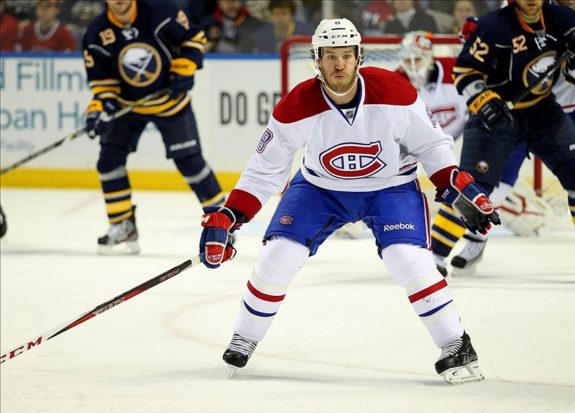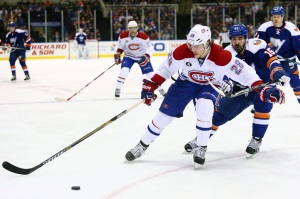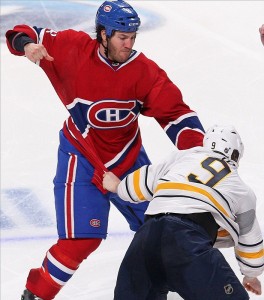As you might have read by now, on February 3rd, Montreal Canadiens forward Brandon Prust contributed an article to The Players’ Tribune explaining his role as an NHL enforcer.
The article rekindled the debate about whether fighting still has a place in hockey. Contrary to Prust’s articulate article, many believe that enforcers are outdated and fighting no longer has a place in a sport evolving toward speed and skill. Concussions are a serious issue, considering their long-term effects are barely understood. Still, players for the most part are on Prust’s side.

My stance on fighting lies somewhere in the middle. I believe enforcers and fighting still have a place in today’s NHL. I agree with Prust’s belief in “the code” because the NHL isn’t doing enough to protect its players. But I also feel strongly that players should not be groomed to be fighters.
Prust’s Argument
According to Prust, whose role is to be police and protector on the ice, fighting keeps players in check.
“If fighting didn’t exist,” Prust writes, “those guys [who don’t respect their fellow players] could skate around all game trying to head-hunt the skill players on the other team with no repercussions.”
He goes on to argue that “in a fight, there are no cheap shots. If you take away fighting, there’s no real consequence for guys taking runs at each other.”
Players will always argue that fighting is a player’s way of enforcing respect: Without it, high sticks, targeted hits, cross checks etc. will increase, along with debilitating injuries; as players find other ways to vent their frustration in a physical and emotional game.
The argument stems from a skeptical belief that the NHL and referees don’t do enough to control the players or the game, and often get it wrong.
Instigating. Not called. Punching in back of the head after fight is over. Not called. WTF? refs officiating for a tie game. #habs #nhl
— StPatrick33 (@StPatrick33) February 20, 2015
The NHL’s Role in Fighting
The NHL has been slow to revise its policing policies no matter how many former players take up the charge as Director of Player Safety. Rule changes implemented this season are intended to increase the possibility of suspensions by categorizing clipping, boarding, elbowing, charging, kneeing and interference calls with the same severity as boarding or checking from behind. Yet, the number of suspensions in 2014-2015 is down compared to last season.
While the NHL tries to find new and better ways to prevent injuries or unnecessary violence, the players will continue to defend each other, and rightfully so. The players’ code is meant to impose respect, a lack of which seems to be increasing as equipment gets heavier and the game grows faster.
Prust’s Argument in Context
Take, for example, Toronto Maple Leafs forward David Clarkson who decided to earn his paycheck as a pest during a recent game against the Montreal Canadiens.
In the first period alone, Clarkson was handed 27 minutes in penalties for various infractions including a game misconduct for a hit on veteran defenseman Sergei Gonchar. While Gonchar crouched on the ice, 22-year-old defenseman Nathan Beaulieu came to his defense:
In this case, the NHL got it partially right by slapping Clarkson with a five-minute major and a game misconduct for the hit. However, there was no supplementary discipline on the play, though Gonchar has missed six games with an upper body injury and is still listed as day-to-day.
Nathan Beaulieu also got it right for stepping in to defend his teammate.
When asked about the fight Beaulieu stated: “I didn’t like the hit. I was just the guy there. Anyone on this team would have done the same thing. There’s a little special bond between me and Gonchar. He’s taken care of me since I’ve been up, so it was good that I could do that for him. He’s been so good to me so far.”

Since the hit on Gonchar is considered nothing more severe than ‘questionable’, Beaulieu sent the powerful message that the Habs will not tolerate players running their own, especially not a revered veteran. Even if the NHL didn’t take exception to the hit, the players did.
Beaulieu ended up with 17 minutes worth of penalties for fighting Clarkson, including instigating and a misconduct. Those minutes could have been used to help his team, now down a defenseman, but when asked about Beaulieu’s fight teammate P.K. Subban supported Beaulieu’s decision: “He did a great job. It says a lot when a young guy coming up — and I’m not that much older than him — commands that type of respect from his teammates by doing that.”
The fight shifted momentum in the Habs’ favour and they won the game in a shootout. Beaulieu’s confidence also grew ten-fold. He has a goal, the first of his career, and an assist in the six games since and his playing time has increased significantly. Beaulieu honoured the code and was rewarded, even praised, for it.
The thing is, in Beaulieu’s case, he has a reputation for being a solid puck-moving defenseman. He has talent enough to be among the top four on the roster and has earned his playing time because of his skill set not his fists. What about the players who earn their playing time simply by fighting?
Where Fighting Becomes Problematic
Fighting may have been the catalyst that brought Prust to the NHL but he contributes more to the game than being an enforcer. His ability to defend his teammates is simply an added bonus to his hustle and forechecking abilities.
The problem with Prust’s argument is that aspiring NHLers will think fighting can also be their meal ticket when it should be their garnish; and coaches will inevitably pigeon-hole those players when they struggle to prove themselves in other areas.
At 6’6″, Habs defenseman Jarred Tinordi is an imposing physical presence, but one better suited to laying out a solid hit than trading punches.
In 4 games with the Habs since being called up on February 19th, Tinordi has 2 fights, neither of which had any overall impact on the game. They felt more like a lobby for playing time than a summon for respect.
Yes, against the Columbus Blue Jackets last Saturday, Tinordi defended teammate Christian Thomas who was hit hard into the boards by Jared Boll.
I understand why he would stand up for his teammate but Therrien, and by extension the NHL, is doing the game a disservice by allowing Tinordi, who was the victim of a vicious blow by a knockout artist in the AHL in January, to be fighting so soon after a scary incident just so he can prove his worth.
Hits, like the one he laid on Florida Panthers forward Derek MacKenzie, should be enough.
Tinordi was sporting a jaw protector after the fight and Boll was assessed an additional penalty for roughing on the play. But what do those extra two minutes mean to a player who judges his own worth by the PIM stat?
Blame the Game

Bad hits will happen in hockey, I get that. It happens in any physical sport. What the NHL does to control and penalize those hits will dictate the evolution of fighting in the NHL.
Until the proper measures are in place to ensure a player’s health, enforcers like Prust, Clarkson and even Boll will continue to police the game their own way and players like Beaulieu will step in when needed.
It’s not necessarily a bad thing. A team bond is a special thing to witness and as Prust stated in his article, “It’s a stressful job, but I genuinely love the feeling of sticking up for my teammates.”
If the NHL is serious about ridding the game of fighting, then it’s up to them to be the police and protector, and part of protecting means a conscious effort to encourage players to make their own space as something other than a pugilist.
Don’t blame the players. Blame the game.
Right on Prusty-keep up the good work. He always plays hard, honest hockey-and doesn’t back down, even when the odds might not favour him. It’s great to see Beaulieu getting the minutes and he’s making that look like a good decision. I think Tinordi will come along fine too- needs a little rounding out, and that’s one big reason why guys like Gonchar, Weaver and Tom Gilbert are on the roster as well. Go Habs Go.